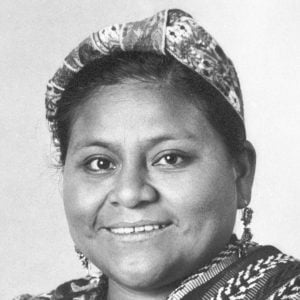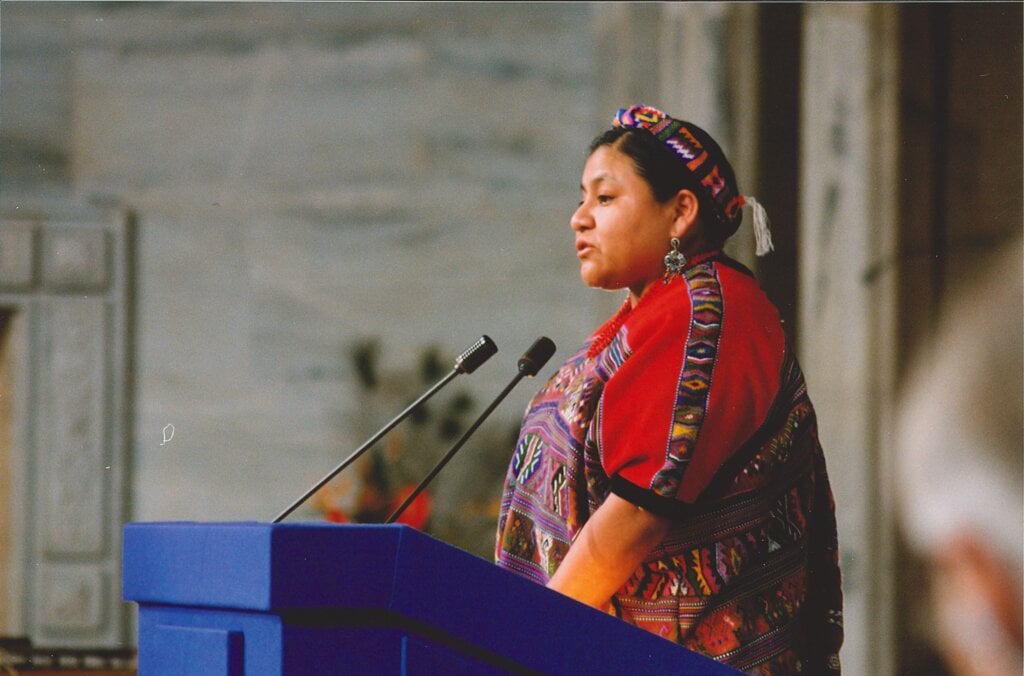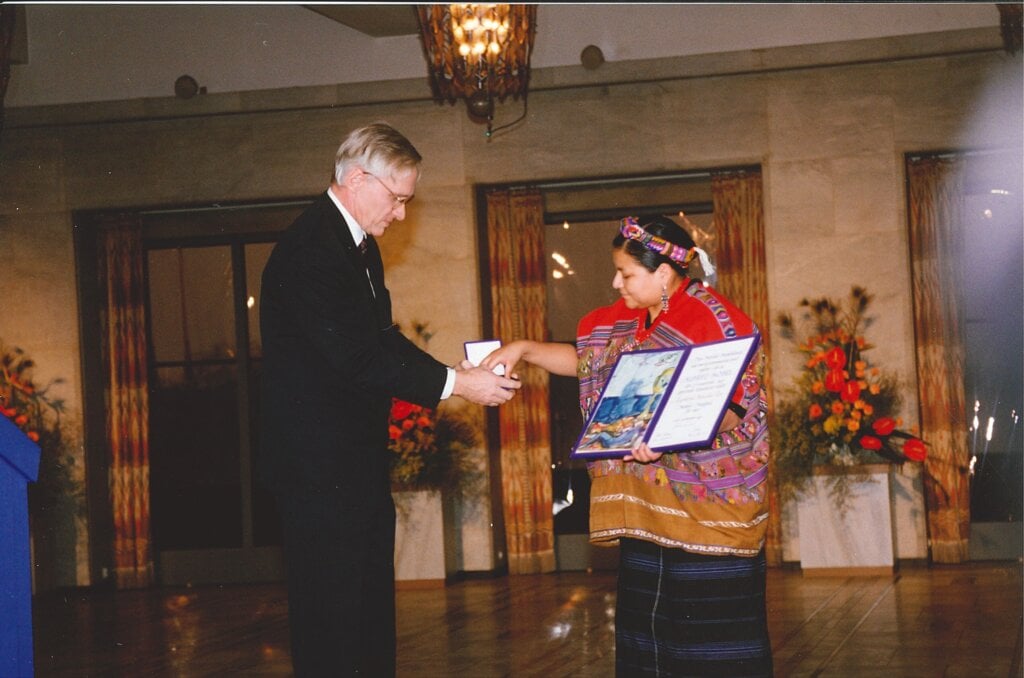Rigoberta Menchú Tum
Speed read
Rigoberta Menchú Tum was awarded the Nobel Peace Prize for her struggle for social justice and reconciliation based on respect for the rights of indigenous peoples.

Full name: Rigoberta Menchú Tum
Born: 9 January 1959, Aldea Chimel, Guatemala
Date awarded: 16 October 1992
Promoting the rights of indigenous peoples
1992 marked the 500th anniversary of Columbus’ arrival in the Americas. That same year, Rigoberta Menchú, a Mayan leader from Guatemala, was awarded the Nobel Peace Prize for her campaign for the rights of indigenous peoples. Her candidacy was initially launched by indigenous organisations to draw attention to the fact that European discovery of the Americas had brought death and destruction to the people already living there. Rigoberta Menchú grew up in a country characterised by extreme violence. Both parents and one of her brothers were killed by the army in its pursuit of genuine or alleged communists. After fleeing to Mexico in the early 1980s, Menchú encountered European groups working for human rights in Latin America. From the late 1980s she actively promoted reconciliation with the authorities to bring an end to the civil war in Guatemala.
”Today, Rigoberta Menchú stands out as a vivid symbol of peace and reconciliation across ethnic, cultural and social dividing lines, in her own country, on the American continent, and in the world.”
The Norwegian Nobel Committee, Announcement, 1992.
| Human rights Rights that apply to all persons regardless of gender, race, ethnicity, religious affiliation or nationality. The most important are the rights enshrined in the UN Declaration of Human Rights, adopted in 1948. |
”I wish that a conscious sense of peace and a feeling of human solidarity would develop in all peoples, which would open new relationships of respect and equality for the next millennium, to be ruled by fraternity and not by cruel conflicts.”
Rigoberta Menchú Tum, Nobel Prize lecture, 10 December 1992.

A family ravaged by death
Rigoberta Menchú’s father was a peasant leader who tried to prevent Guatemalan estate owners from appropriating land belonging to indigenous people. Menchú accompanied her father on his visits to villages to encourage resistance. The army labelled all opposed to the regime as communist. One of Menchú’s brothers was captured, tortured and killed publicly as a warning to villagers. In 1980 her father died in a fire when he and other activists occupied the Spanish embassy in Guatemala City to draw world attention to the oppression of the Mayan people. That same year, Menchú’s mother was raped and mutilated, ultimately dying from her injuries.
| Communism From the Latin “communitas” meaning community. Based on the teachings of Marx that argued workers were destined to be united in a world free of exploitation and oppression. After the Russian Revolution of 1917, used by those who agreed with Lenin that a violent revolution against capitalism was the only means of achieving this goal. |
Rigoberta Menchú flees Guatemala
In the early 1980s, civil war was raging in Guatemala. Both left-wing radicals and indigenous groups revolted against the government’s oppression. The army labelled all rebels as communists. Rigoberta Menchú lost both of her parents and one of her brothers in this struggle. She herself organised strikes and demonstrations and was wanted by the authorities. Finally she was forced to flee the country, seeking refuge in Mexico along with thousands of others from Guatemala.
Criticism of Rigoberta Menchú
Rigoberta Menchú’s peace prize was met with widespread support, although the Guatemalan government was reluctant to extend its congratulations. Menchú herself was appointed UN ambassador for indigenous populations. A US researcher has raised doubts about the details in Rigoberta Menchú’s life story. While not opposed to her selection as Nobel Peace Prize laureate, he claimed she was more closely affiliated with a communist guerilla group than she was willing to admit. Regardless, Menchú has become a symbol of success to native peoples of the Western Hemisphere. Her achievements encourage all indigenous women to hold their heads higher.

”… Whatever the facts of her particular life, the prize was intended to dramatize the historical debt owed to the native people of the Western Hemisphere. The prize was also intended to encourage peace talks in her homeland of Guatemala.”
David Stoll: 'Rigoberta Menchú and the Story of All Poor Guatemalans', page ix, Westview Press 1999.
Learn more
Rigoberta Menchú was born on January 9, 1959 to a poor Indian peasant family and raised in the Quiche branch of the Maya culture. In her early years she helped with the family farm work, either in the northern highlands where her family lived, or on the Pacific coast, where both adults and children went to pick coffee on the big plantations ...
Disclaimer: Every effort has been made by the publisher to credit organisations and individuals with regard to the supply of photographs. Please notify the publishers regarding corrections.
Nobel Prizes and laureates
Six prizes were awarded for achievements that have conferred the greatest benefit to humankind. The 12 laureates' work and discoveries range from proteins' structures and machine learning to fighting for a world free of nuclear weapons.
See them all presented here.
